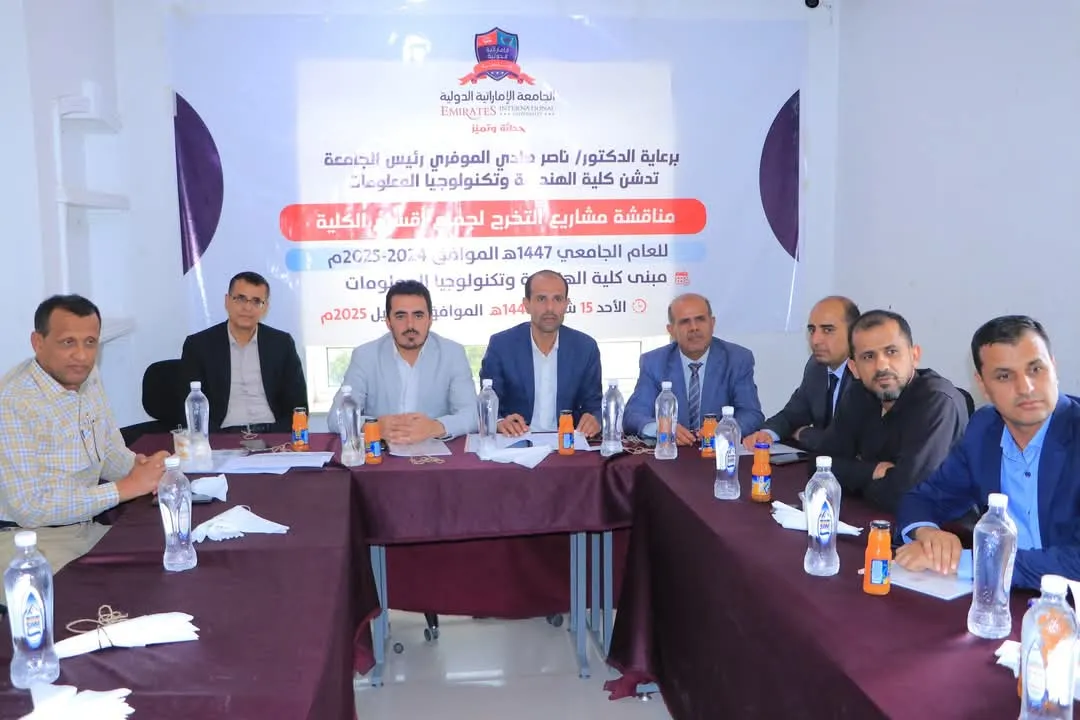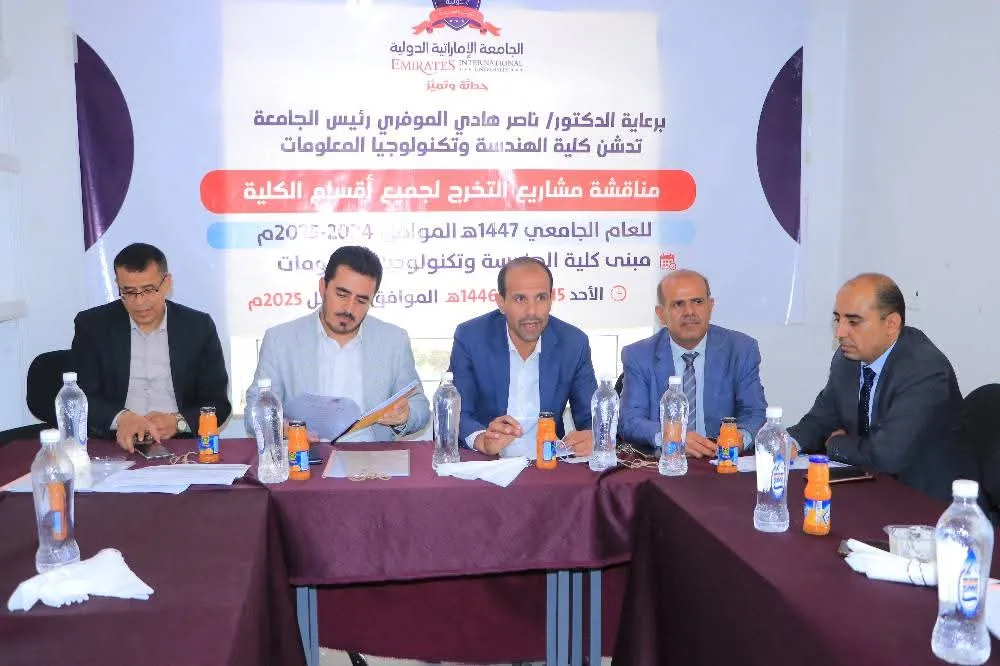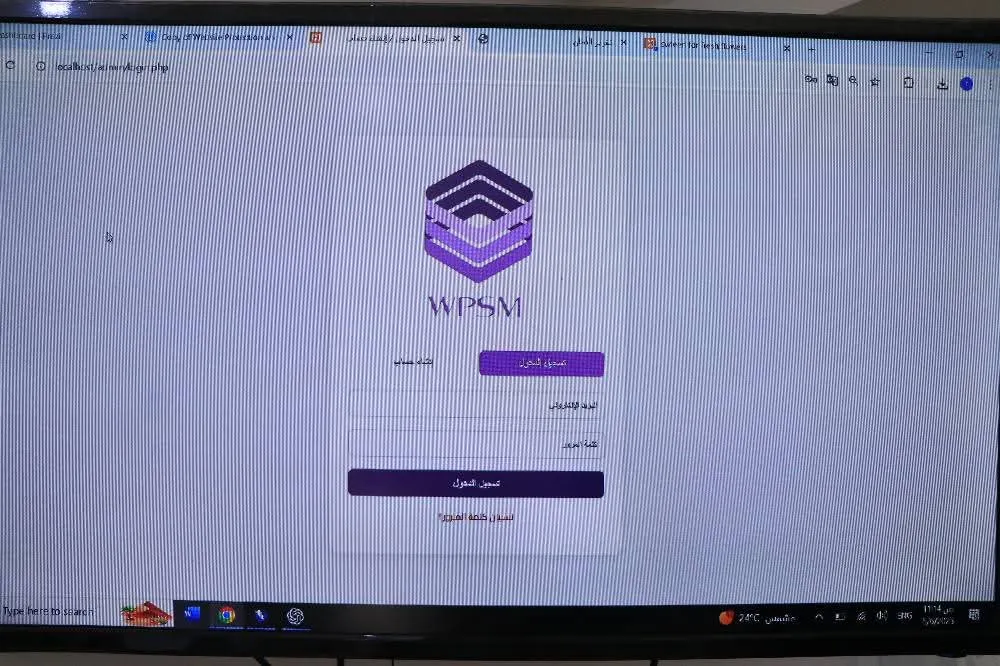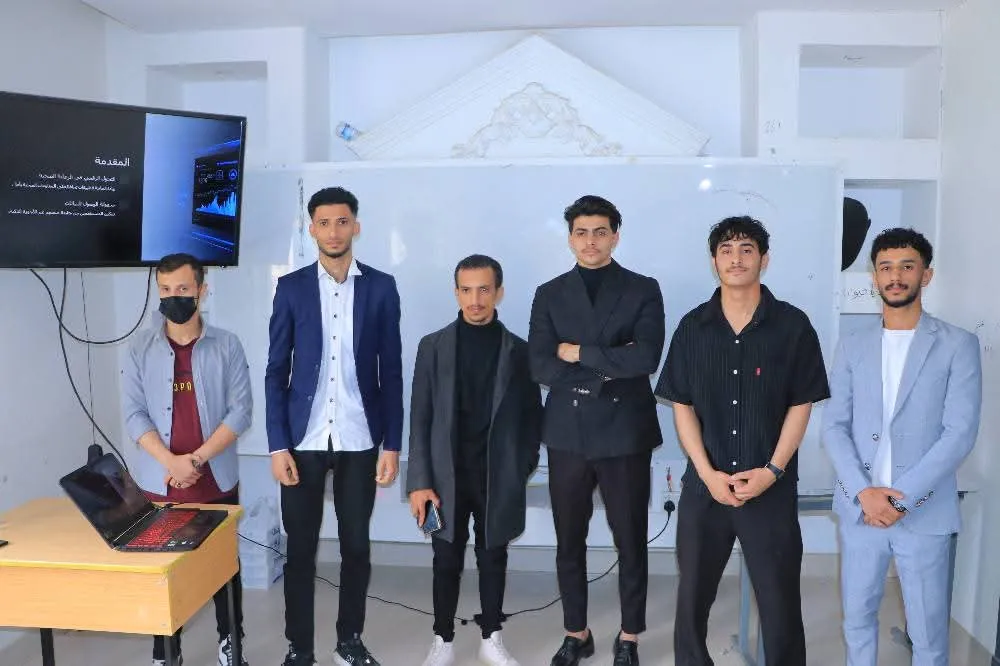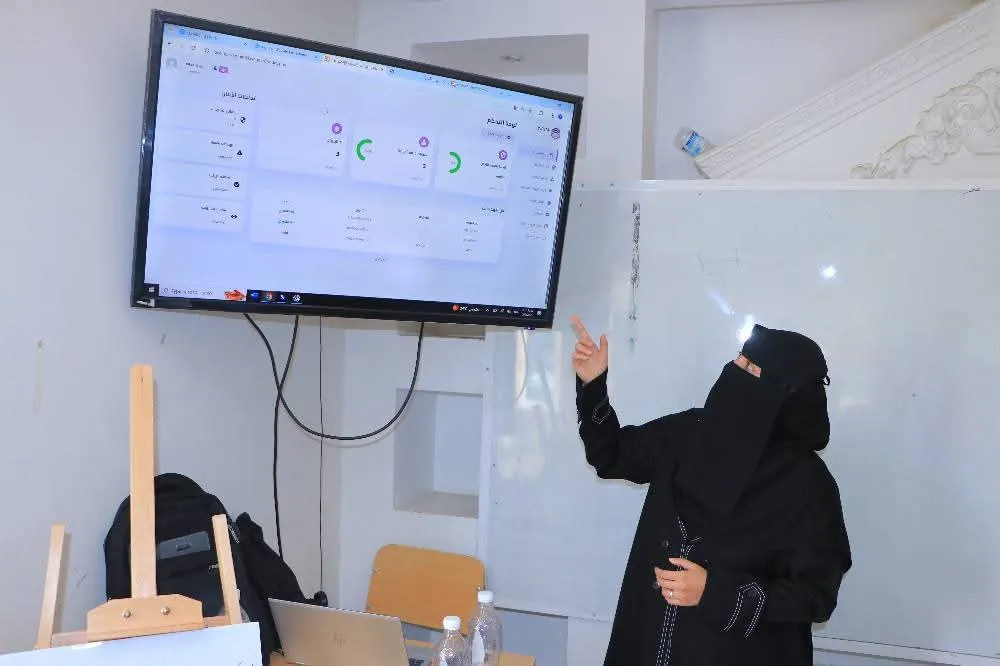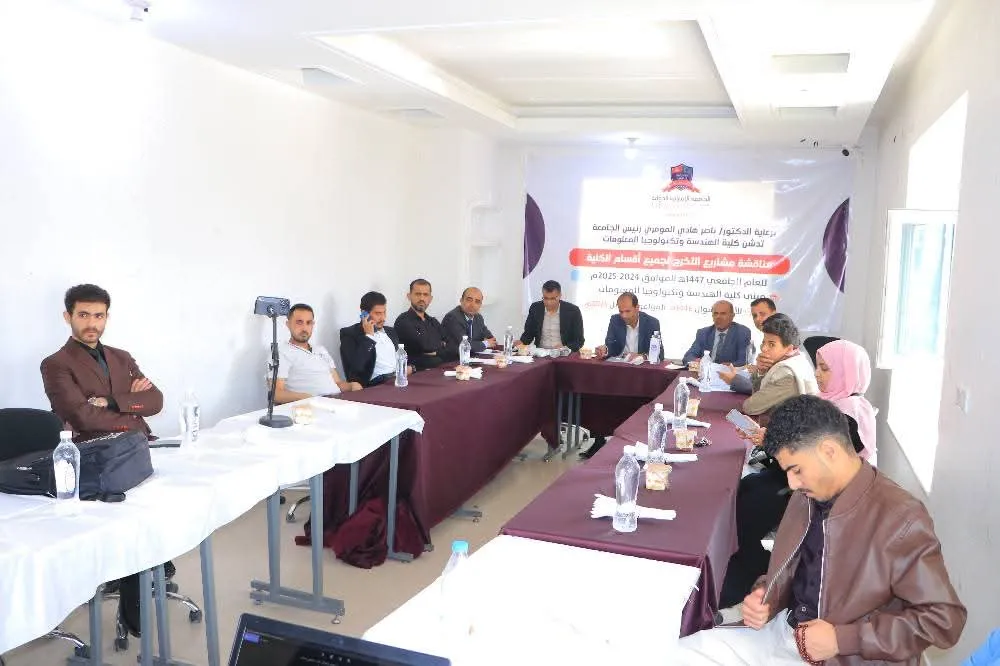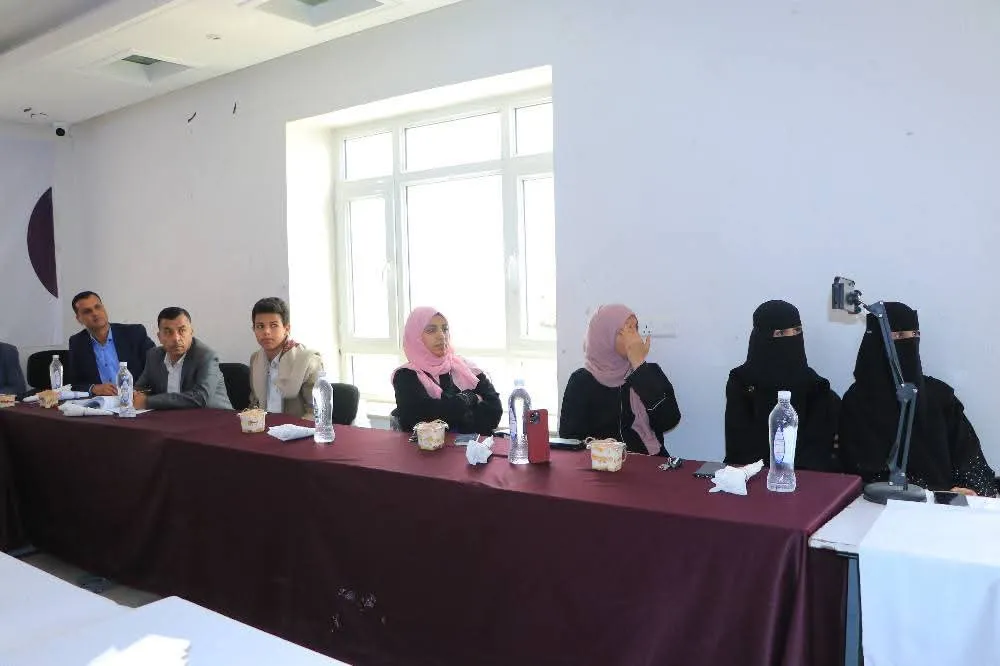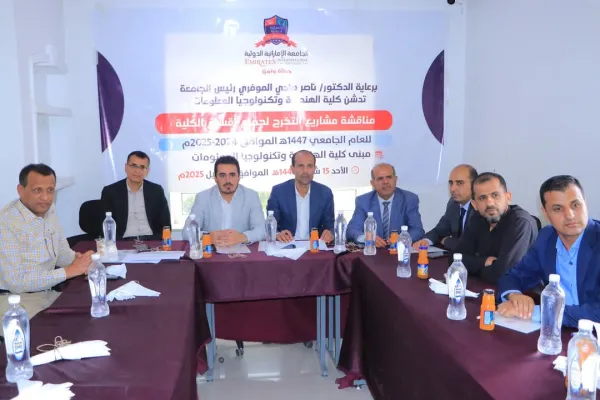
Discussions of graduation projects for students in the College of Engineering and Information Technology at the university for the academic year 1446 AH (2024-2025 AD) continue.
University Media
The College of Engineering and Information Technology at the Emirates International University continues to discuss its students' graduation projects for the academic year 1446 AH (2024-2025 AD), amid a vibrant and innovative academic atmosphere. Since the beginning of last week, the college halls have hosted successive sessions to present graduation projects, reflecting the distinguished research and academic efforts of students under the supervision of a select group of faculty members.
The projects presented today varied across the disciplines of information security and information technology. The attendees included the President of the University, Dr. Nasser Hadi Al-Muwafari; the Secretary-General, Dr. Fouad Ismail Hanash; the Dean of the College of Engineering, Dr. Ibrahim Farea; the Dean of the Center for Development and Quality Assurance, Dr. Sharaf Al-Hamdi; the Head of the Cybersecurity Department, Dr. Jameel Rashid; and a number of academic staff. The projects presented focused on innovative technological solutions that meet the needs of society and keep pace with modern scientific developments, such as smart city systems, artificial intelligence technologies, infrastructure improvement, and other related topics. Today, several projects were discussed, as follows:
The first group presented its project: Website Protection and Security Management (WPS).
The Website Protection and Security Management (WPSM) system aims to provide a system that ensures the protection of websites from common threats such as Distributed Denial of Service (DDoS) attacks, SQL Injection, brute force login attempts, and other cyber threats.
The system offers features such as real-time threat monitoring and the ability to take immediate protective measures, including incident logging, automatically blocking malicious IP addresses, and safely redirecting suspicious requests. It also provides easy-to-use management tools that ensure user needs are met while adhering to basic cybersecurity principles.
This project represents a strong step toward better website protection, with the potential to be developed in the future to address more advanced challenges.
Project team members: Asmaa Ahmed Ali Hassan, Rehab Ali Mohammed Al-Habishi, Rafa Hamid Saleh Hassan, and Ghada Mohammed Abdullah Qasim. Supervised by Dr. Jameel Saad Hamza, and Assistant Supervisor: Ms. Samia Al-Idrisi.
The second group from the Information Security Department presented a medical platform application for patient and physician data. The project team included: Nawaf Ali Muhammad Al-Sabry, Imran Saeed Fadl Talib, Arkan Muhammad Numan Salam, Mushir Abdul Rafiq Abdul Rahman Mahyoub, Abdul Hamid Fadl Al-Jubi, and Yasser Abdul Karim Al-Magharm. Project Supervisor: Dr. Jameel Rashid, and Assistant Supervisor: Mr. Zaid Al-Washli.
The third group from the Information Technology Department presented their project: Smart Attendance. This project is a unified system for educational institutions to monitor student attendance using facial recognition technology to ensure students adhere to established laws and regulations and assess their academic performance.
The project was submitted by students: Rashad Ahmed Rashid Al-Ahsab, Muhammad Nabil Al-Ammari, Ahmed Bashir Al-Abi, Shihab Jameel Hamil, Omar Badie Al-Dhaheri, and Ali Abdul Qader Banajah. It was supervised by Dr. Ahmed Sultan Al-Hijami, and Assistant Supervisor: Engineer Ahlam Al-Hamdani.
The fourth group from the Information Technology Department presented their project: Diagnosing Eye Diseases Using the ResNet50V2 Algorithm. This project involves designing and developing a smart application that identifies eye diseases using images taken from a mobile phone camera. The application analyzes the input image using a pre-trained artificial intelligence model, then displays the disease affecting the eye to the user, along with the accuracy of the analysis. It also allows the user to send medical reports to the doctor and receive medical responses from the doctor.
The diseases the model was trained on include: glaucoma, cataract, age-related macular degeneration (AMD), myopia, and normal vision. The project was submitted by students: Mahmoud Saeed Al-Maamari, Ali Abdul Razzaq Al-Qabati, Muhammad Talha Al-Tawil, Murad Anwar Al-Shaabi, Nazim Saddam Al-Dala'a, and Muhammad Arif Al-Jaboubi. It was supervised by Dr. Hisham Aqlan and supervised by Ms. Najwa Al-Khawlani.
The university president emphasized that these discussions represent the fruit of years of hard work and diligence, and reflect the progress the college has made in enhancing students' practical and research skills. He praised the high quality of the projects and the quality of the ideas presented.
This step comes as part of the university's commitment to supporting scientific research, developing students' capabilities, and enhancing their readiness for the job market by integrating academic knowledge with practical applications.
Website:
https://eiu.edu.ye
#Emirati_International_University
#Modernity_Excellence
#EIU

